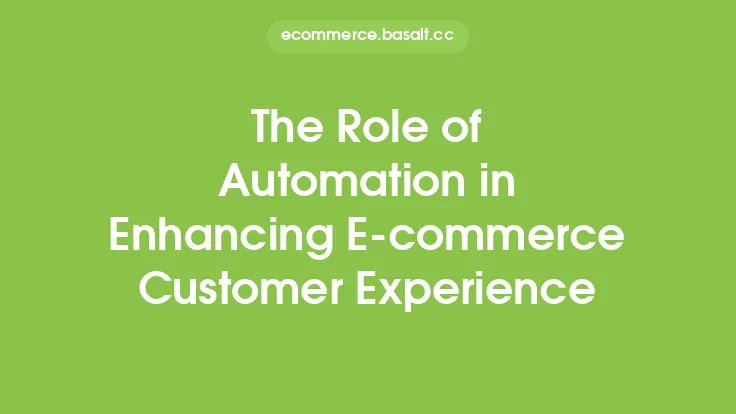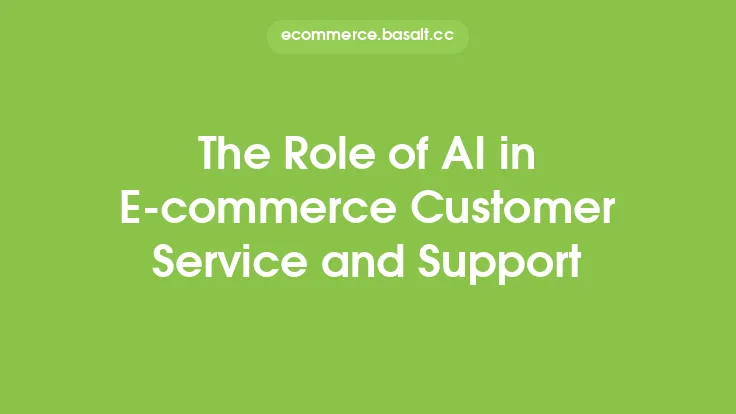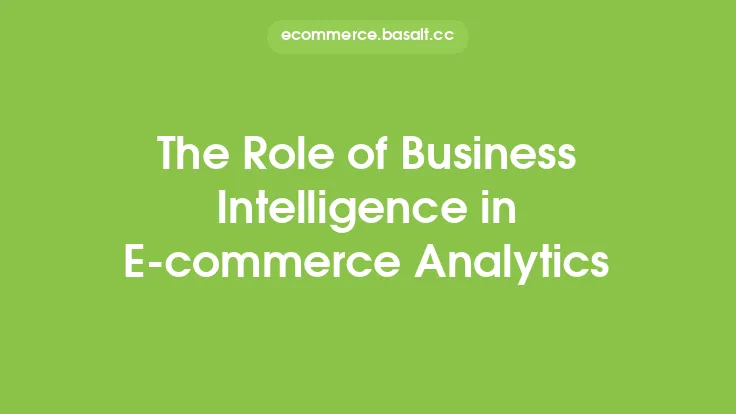The e-commerce industry has undergone significant transformations in recent years, driven by advances in technology and changing consumer behaviors. One key factor contributing to this evolution is the integration of artificial intelligence (AI) in e-commerce platforms. AI has revolutionized the way online businesses operate, enabling them to provide personalized experiences, streamline operations, and drive sales. In this article, we will delve into the role of AI in e-commerce, exploring its applications, benefits, and future implications.
Introduction to Artificial Intelligence in E-commerce
Artificial intelligence refers to the development of computer systems that can perform tasks that typically require human intelligence, such as learning, problem-solving, and decision-making. In the context of e-commerce, AI is used to analyze customer data, preferences, and behaviors, allowing businesses to create tailored experiences that meet individual needs. AI-powered systems can process vast amounts of data, identify patterns, and make predictions, enabling e-commerce companies to optimize their operations, improve customer satisfaction, and increase revenue.
Applications of Artificial Intelligence in E-commerce
AI has numerous applications in e-commerce, including:
- Personalized Recommendations: AI-powered recommendation engines analyze customer browsing history, search queries, and purchase behavior to suggest relevant products, enhancing the shopping experience and encouraging sales.
- Chatbots and Virtual Assistants: AI-driven chatbots and virtual assistants provide 24/7 customer support, answering queries, and helping customers with their purchases, reducing the workload for human customer support agents.
- Predictive Analytics: AI-powered predictive analytics tools analyze customer data, sales trends, and market conditions to forecast demand, enabling businesses to optimize inventory management, pricing, and marketing strategies.
- Image and Voice Recognition: AI-powered image and voice recognition technologies enable customers to search for products using visual or voice queries, making the shopping experience more intuitive and convenient.
- Fraud Detection and Prevention: AI-powered systems monitor transactions, detect anomalies, and prevent fraudulent activities, protecting both customers and businesses from financial losses.
Benefits of Artificial Intelligence in E-commerce
The integration of AI in e-commerce offers numerous benefits, including:
- Enhanced Customer Experience: AI-powered personalization, recommendation engines, and chatbots create a tailored and engaging shopping experience, increasing customer satisfaction and loyalty.
- Increased Efficiency: AI automates routine tasks, such as data analysis, customer support, and inventory management, freeing up human resources for more strategic and creative work.
- Improved Accuracy: AI-powered systems reduce errors, improve data accuracy, and enhance decision-making, leading to better business outcomes.
- Competitive Advantage: Businesses that adopt AI technologies can differentiate themselves from competitors, establishing a leadership position in the market.
- Scalability: AI-powered systems can handle large volumes of data, traffic, and transactions, enabling businesses to scale quickly and efficiently.
Challenges and Limitations of Artificial Intelligence in E-commerce
While AI offers numerous benefits, there are also challenges and limitations to consider:
- Data Quality and Availability: AI systems require high-quality, relevant, and abundant data to function effectively, which can be a challenge for businesses with limited data resources.
- Complexity and Integration: AI technologies can be complex and require significant integration efforts, which can be time-consuming and costly.
- Transparency and Explainability: AI decision-making processes can be opaque, making it challenging to understand and explain the reasoning behind AI-driven recommendations or decisions.
- Bias and Fairness: AI systems can perpetuate biases and discrimination if they are trained on biased data or designed with a particular worldview.
- Security and Privacy: AI systems can be vulnerable to cyber threats and data breaches, compromising customer privacy and security.
Future of Artificial Intelligence in E-commerce
The future of AI in e-commerce is promising, with ongoing advancements in technologies like machine learning, natural language processing, and computer vision. As AI continues to evolve, we can expect to see:
- Increased Adoption: More businesses will adopt AI technologies, driving innovation and competition in the e-commerce industry.
- Improved Personalization: AI-powered personalization will become even more sophisticated, enabling businesses to create highly tailored experiences that meet individual customer needs.
- Enhanced Customer Service: AI-driven chatbots and virtual assistants will become more advanced, providing seamless and intuitive customer support.
- Greater Efficiency: AI will continue to automate routine tasks, freeing up human resources for more strategic and creative work.
- New Business Models: AI will enable new business models, such as subscription-based services, product-as-a-service, and data-driven marketplaces.
Conclusion
Artificial intelligence is revolutionizing the e-commerce industry, enabling businesses to provide personalized experiences, streamline operations, and drive sales. While there are challenges and limitations to consider, the benefits of AI in e-commerce are undeniable. As AI continues to evolve, we can expect to see increased adoption, improved personalization, enhanced customer service, greater efficiency, and new business models. By embracing AI technologies, e-commerce businesses can stay ahead of the competition, drive growth, and create a better future for their customers.





